CHICAGO (AP) — Raucous cheers broke out among a large portion of the crowd that had gathered for a rally by Republican presidential candidate Donald Trump. The spark was Trump's decision to cancel the event after protesters packed the arena and organizers feared there would be violence.
Some isolated confrontations took place after the cancellation and police reported arresting five people. Many anti-Trump attendees had rushed onto the floor of the University of Illinois at Chicago Pavilion, jumping up and down with their arms up in the air.
"Trump represents everything America is not and everything Chicago is not," said Kamran Siddiqui, 20, a student at the school who was among those celebrating. "We came in here and we wanted to shut this down. Because this is a great city and we don't want to let that person in here."
Some supporters of the Republican front-runner started chanting "We want Trump! We want Trump!" in response to the celebrations.
"It's a shame," said Trump supporter Bill Tail, 43, of the Chicago suburb of Oaklawn. "They scream about tolerance, but are being intolerant themselves. That doesn't make sense."
As Trump attempts to unify a fractured Republican Party ahead of Tuesday's slate of winner-take-all primary elections, the confrontations between his legion of loyal supporters and protesters who accuse him of stoking racial hatred have become increasingly contentious, underscoring concerns about the divisive nature of his candidacy.
A North Carolina man was arrested after video footage showed him punching an African-American protester being led out of a Trump rally in that state on Wednesday. At that event, Trump recalled a past protester as "a real bad dude."
"He was a rough guy, and he was punching. And we had some people — some rough guys like we have right in here — and they started punching back," Trump said. "It was a beautiful thing."
At Trump's rally earlier Friday in St. Louis, he was repeatedly interrupted by protesters. Police there charged nearly three dozen people with general peace disturbance and one person with assault.
Texas Sen. Ted Cruz, second in delegates to Trump in the GOP race, said late Friday that the billionaire has created "an environment that encourages this sort of nasty discourse."
"When the candidate urges supporters to engage in physical violence, to punch people in the face, the predictable consequence of that is that is escalates," Cruz said. "Today is unlikely to be the last such incidence."
In a telephone interview after postponing his event in Chicago, Trump said he didn't "want to see people hurt or worse" at the rally, telling MSNBC, "I think we did the right thing."
But Chicago police said they had sufficient manpower on scene to handle the situation and did not recommended Trump cancel the rally. That decision was made "independently" by the campaign, said police spokesman Anthony Guglielmi.
Trump said the anger on display in Chicago wasn't directed at him or his campaign, but rather was a manifestation of the public's deep frustration with economic conditions in the country.
"Our businesses are being taken away from us, our businesses are being moved out of the country," Trump said on Fox News. "This is a demonstration against economic conditions on both sides."
But many of the protesters in Chicago said they were there to specifically to stop Trump from speaking.
"Our country is not going to make it being divided by the views of Donald Trump," said Jermaine Hodge, a 37-year-old lifelong Chicago resident who owns a trucking company. "Our country is divided enough. Donald Trump, he's preaching hate. He's preaching division."
Indeed, Trump taunted the protesters at his rally in St. Louis, panning them as weak "troublemakers," and ordered them to "go home to mommy" or "go home and get a job" because "they contribute nothing."
"These are not good people, just so you understand," Trump said. "These are not the people who made our country great. These are the people that are destroying our country."
Dozens of University of Illinois at Chicago faculty and staff had petitioned university administrators earlier in the week to cancel the Friday night rally, citing concerns it would create a "hostile and physically dangerous environment" for students.
One Trump supporter at the Chicago rally said Trump had created the environment that led to Friday night's melee by holding the event at the school — a civil and immigrant rights organizing hub with large minority student populations.
"I think he was kind of provoking things, to be honest with you," said Dan Kozak, 23, from suburban Tinley Park. "He could have picked the suburbs and nothing would have happened."
Hours before the event in Chicago was scheduled to start, hundreds of people lined up to get into the arena. Trump backers were separated from an equally large crowd of anti-Trump protesters by a heavy police presence and barricades.
Once inside, some supporters and protesters engaged in a series of intense verbal altercations. For the first time during Trump's White House bid, the crowd at one of his events appeared to be an equal mix of those eager to cheer on the real estate mogul and those overtly opposed to his candidacy.
___
Associated Press writers Don Babwin in Chicago, Meg Kinnard in Columbia, South Carolina, and Julie Pace in Miami contributed to this report.
___
Follow Jill Colvin and Michael Tarm on Twitter at: http://twitter.com/colvinj and https://twitter.com/mtarm

